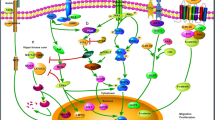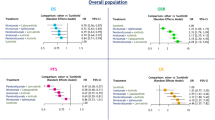Abstract
In recent years, molecular-targeted agents have been used clinically to treat various malignant tumors. In May 2009, sorafenib (Nexavar®) was approved in Japan for “unresectable hepatocellular carcinoma (HCC)”, and was the first molecular-targeted agent for use in liver cancer. To date, sorafenib is the only molecular-targeted agent whose survival benefit has been demonstrated in two global phase III randomized controlled trials, and it has now been approved worldwide. Phase III clinical trials are now underway to compare other molecular-targeted agents with sorafenib as first-line treatment agents, and to evaluate other multi-kinase inhibitors of the vascular endothelial growth factor and platelet-derived growth factor receptors, as well as drugs targeting the epidermal growth factor receptor, insulin-like growth factor receptor, and mammalian target of rapamycin, in addition to other molecules targeting other components of the signal transduction pathways. This review outlines the main pathways involved in the development and progression of HCC and the agents that target these pathways.




Similar content being viewed by others
References
Farazi PA, DePinho RA (2006) Hepatocellular carcinoma pathogenesis: from genes to environment. Nat Rev Cancer 6:674–687
Minguez B, Tovar V, Chiang D et al (2009) Pathogenesis of hepatocellular carcinoma and molecular therapies. Curr Opin Gastroenterol 25:186–194
Villanueva A, Newell P, Chiang DY et al (2007) Genomics and signaling pathways in hepatocellular carcinoma. Semin Liver Dis 27:55–76
Laurent-Puig P, Zucman-Rossi J (2006) Genetics of hepatocellular tumors. Oncogene 25:3778–3786
Llovet JM, Bruix J (2008) Molecular targeted therapies in hepatocellular carcinoma. Hepatology 48:1312–1327
Hopfner M, Shuppan D, Scherubl H (2008) Growth factor receptors and related signaling pathways as target for novel treatment strategies of hepatocellular cancer. World J Gastroenterol 14:1–14
Campbell JS, Hughes SD, Gilbertson DG et al (2005) Platelet-derived growth factor C induces liver fibrosis, steatosis, and hepatocellular carcinoma. Proc Natl Acad Sci 102:3389–3394
Ogasawara S, Yano H, Iemura A et al (1996) Expression of basic fibroblast growth factor and its receptors and their relationship to proliferation of human hepatocellular carcinoma cell lines. Hepatology 24:198–205
Kudo M (2008) Hepatocellular carcinoma 2009 and beyond: from the surveillance to molecular targeted therapy. Oncology 75:S1–S12
Roberts PJ, Der CJ (2007) Targeting the Raf-MEK-ERK mitogen-activated protein kinase cascade for the treatment of cancer. Oncogene 26:3291–3310
Schmidt CM, McKillop IH, Cahill PA et al (1997) Increased MAPK expression and activity in primary human hepatocellular carcinoma. Biochem Biophys Res Commun 236:54–58
Huynh H, Nguen TTT, Chow KHP et al (2003) Over-expression of the mitogen-activated protein kinase (MAPK) kinase (MEK)-MAPK in hepatocellular carcinoma: its role in tumor progression and apoptosis. BMC Gastroenterology 3:19–30
Calvisi DF, Ladu S, Gorden A et al (2006) Ubiquitous activation of Ras and Jak/Stat pathways in human HCC. Gastroenterology 130:1117–1128
Bos JL (1989) ras Oncogenes in human cancer: review. Cancer Res 49:4682–4689
Beeram M, Patnaik A, Rowinsky EK (2005) Raf: a strategic target for therapeutic development against cancer. J Clin Oncol 23:6771–6790
Tannapfel A, Sommerer F, Benicke M et al (2003) Mutations of the BRAF gene in cholangiocarcinoma but not in hepatocellular carcinoma. Gut 52:706–712
Jenke HS, Deml E, Oesterle D (1994) C-raf expression in early ratliver tumorigenesis after promotion with polychlorinated biphenyls or Phenobarbital. Xenobiotica 24:569–580
Beer DG, Neveu MJ, Paul DL et al (1998) Expression of the c-raf protooncogene, gamma-glutamyltranspeptidase, and gap junction protein in rat liver neoplasms. Cancer Res 48:1610–1617
Hwang YH, Choi JY, Kim S et al (2004) Over-expression c-raf-1 proto-oncogene in liver cirrhosis and hepatocellular carcinoma. Hepatol Res 29:113–121
Wilhelm SM, Adnane L, Newell P et al (2008) Preclinical overview of sorafenib, a multikinase inhibitor that targets both Raf and VEGF and PDGF receptor tyrosine kinase signaling. Mol Cancer Ther 7:3129–3140
Ohren JF, Chen H, Pavlovsky A et al (2004) Structures of human MAP kinase kinase 1(MEK1) and MEK2 describe novel non competitive kinase inhibition. Nat Struct Mol Biol 11:1192–1197
Huynh H, Nguyen TTT, Chow KHP et al (2003) Over-expression of the mitogen-activated protein kinase (MAPK) kinase (MEK)-MAPK in hepatocellular carcinoma: its role in tumor progression and apoptosis. BMC Gastroenterol 3:19–40
Engelma J (2009) Targeting PI3K signalling in cancer: opportunities, challenges and limitations. Nat Rev Cancer 9:550–562
Zhou L, Huang Y, Li J et al (2009) The mTOR pathway is associated with the poor prognosis of human hepatocellular carcinoma. Med Oncol (Epub ahead of print)
Chen J, Wang Q, Fu X et al (2009) Involvement of PI3K/PTEN/AKT/mTOR pathway in invasion and metastasis in hepatocellular carcinoma: association with MMP-9. Hepatol Res 39:177–186
Villanueva A, Chiang DY, Newell P et al (2008) Pivotal role of mTOR signaling in hepatocellular carcinoma. Gastroenterology 135:1972–1983
Treiber G (2009) mTOR inhibitors for hepatocellular carcinoma: a forward-moving target. Expert Rev Anticancer Ther 9:247–261
Ferrara N, Davis-Smyth T (1997) The biology of vascular endothelial growth factor. Endocr Rev 18:4–25
Griffioen AW, Molema G (2000) Angiogenesis: potentials for pharmacologic intervention in the treatment of cancer, cardiovascular diseases, and chronic inflammation. Pharmacol Rev 52:237–268
Harper SJ, Bates DO (2008) VEGF-A splicing: the key to anti-angiogenic therapeutics? Nat Rev Cancer 8:880–887
Fernandez M, Semela D, Bruix J et al (2009) Angiogenesis in liver disease. J Hepatol 50:604–620
Schoenleber SJ, Kurtzl DM, Talwalkar JA et al (2009) Prognostic role of vascular endothelial growth factor in hepatocellular carcinoma: systematic review and meta-analysis. Br J Cancer 100:1385–1392
Faivre S, Raymond E, Boucher E et al (2009) Safety and efficacy of Sunitinib in patients with advanced hepatocellular carcinoma: an open-label, multicenter, phase II study. Lancet Oncol 10:794–800
Zhu AX, Sahani DV, Duda DG et al (2009) Efficacy, safety, and potential biomarker of sunitinib monotherapy in advanced hepatocellular carcinoma: a phase II study. J Clin Oncol 27:3027–3035
Forner A, Llovet JM, Bruix J (2009) Sunitinib and the benefits of a negative study. Lancet Oncol 10:743–744
Raoul JL, Flinn RS, Kang YK et al (2009) An open-label phase II study of first- and second-line treatment with Brivanib in patients with hepatocellular carcinoma (HCC). J Clin Oncol 27:15S Suppl; Abstr 4577
Kanai F, Yoshida H, Tateishi R et al (2008) Final results of a phase I/II trial of the oral anti-angiogenesis inhibitor TSU-68 in patients with advanced hepatocellular carcinoma. J Clin Oncol 26 (abstract 4589)
Ciardiello F, Tortora G (2008) EGFR antagonists in cancer treatment. N Engl J Med 358:1160–1174
Buckley AF, Burgart LJ, Sahai V et al (2008) Epidermal growth factor receptor expression and gene copy number in conventional hepatocellular carcinoma. Am J Clin Pathol 129:245–251
Philip PA, Mahoney MR, Allmer C et al (2005) Phase II study of erlotinib (OSI-774) in patients with advanced hepatocellular cancer. J Clin Oncol 23:6657–6663
Thomas MB, Chadhal R, Glover K et al (2007) Phase 2 study of erlotinib in patients with unresectable hepatocellular carcinoma. Cancer 110:1059–1066
Thomas MB, Morris JS, Chadha R et al (2009) Phase II trial of the combination of bevacizumab and Erlotinib in patients who have advanced hepatocellular carcinoma. J Clin Oncol 27:843–850
Modified folfox7/bevacizumab or modified Xelox/bevacizumab with or without erlotinib in first-line metastatic colorectal cancer (MCRC): results of the feasibility phase of the DREAM-OPTIMOX3 study (GERCOR). J Clinical Oncol, 2007 ASCO Annual Meeting Proceedings Part I, vol 25, No. 18S: 4097
Tournigand B, Samson W, Scheithauer C et al (2009) mFOLFOX-bevacizumab or XELOX-bevacizumab then bevacizumab alone or with erlotinib in first-line treatment of patients with metastatic colorectal cancer (mCRC): interim safety analysis of DREAM study. J Clin Oncol 27:15S, ASCO Annual Meeting Abstract No:4077C
Hecht JR, Mitchell E, Chidiac T et al (2008) A randomized phase IIIB trial of chemotherapy, bevacizumab, and panitumumab compared with chemotherapy and bevacizumab alone for metastatic colorectal cancer. J Clin Oncol 27:672–680
Azad NS, Posadas EM, Kwitkowski VE et al (2008) Combination targeted therapy with sorafenib and bevacizumab results in enhanced toxicity and antitumor activity. J Clin Oncol 26:3709–3714
Burris HA III, Hurwitz HI, Dees EC et al (2005) Phase I safety, pharmacokinetics, and clinical activity of Lapatinib (GW572016), a reversible dual inhibitor of epidermal growth factor receptor tyrosine kinases, in heavily pretreated patients with metastatic carcinomas. J Clin Oncol 23:5305–5313
Bekaii-Saab T, Markowitz J, Prescott N et al (2009) A multi-institutional phase II study of the efficacy and tolerability of Lapatinib in patients with advanced hepatocellular carcinomas. Clin Cancer Res 15:5895–5901
Zhu AX, Stuart K, Blaszkowsky LS et al (2007) Phase 2 study of cetuximab in patients with advanced hepatocellular carcinoma. Cancer 110:581–589
Comoglio PM, Giordano S, Trusolino L (2008) Drug development of MET inhibitors: targeting oncogene addiction and expedience. Nat Rev Drug Dis 7:501–516
Scharf JG, Braulke T (2003) The role of the IGF axis in hepatocarcinogenesis. Horm Metab Res 35:685–693
Chen YW, Boyartchuk V, Lewis BC (2009) Differential roles of insulin-like growth factor receptor–and insulin receptor–mediated signaling in the phenotypes of hepatocellular carcinoma cells. Neoplasia 11:835–845
Llovet JM, Ricci S, Mazzaferro V et al (2008) Sorafenib in advanced hepatocellular carcinoma. N Engl J Med 359:378–390
Cheng AL, Kang YK, Chen Z et al (2009) Efficacy and safety of sorafenib in patients in the Asia-Pacific region with advanced hepatocellular carcinoma: a phase III randomised, double-blind, placebo-controlled trial. Lancet Oncol 10:25–34
Kudo M (2010) Positioning of a molecular-targeted agent, sorafenib, in the treatment algorithm for hepatocellular carcinoma in Japan, including its impact on complete remission. Oncology (in press)
Okita K, Imanaka K, Chiba N et al (2010) Phase III study of sorafenib in patients in Japan and Korea with advanced hepatocellular carcinoma (HCC) treated after transarterial chemoembolization. ASCO Gastrointestinal Cancers Symposium Proceedings 2010: 89 (LBA128)
Murata K, Suzuki H, Okano H et al (2010) Hypoxia-induced des-γ-carboxy prothrombin production in hepatocellular carcinoma. Int J Clin Oncol 36:161–170
Abou-Alfa GK, Schwartz L, Ricci S et al (2006) Phase II study of sorafenib in patients with advanced hepatocellular carcinoma. J Clin Oncol 24:4293–4300
Toh H, Chen PJ, Carr BI et al (2009) A phase II study of ABT-869 in hepatocellular carcinoma (HCC) : Interim analysis. J Clin Oncol 27:15s (Suppl; Abstr 4581)
Siegel AB, Cohen EI, Ocean A et al (2008) Phase II trial evaluating the clinical and biologic effects of bevacizumab in unresectable hepatocellular carcinoma. J Clin Oncol 26:2992–2998
O’Dwyer PJ, Giantonio BJ, Levy DE et al (2006) Gefitinib in advanced unresectable hepatocellular carcinoma: Results from the Eastern Cooperative Oncology Group’s Study E1203. J Clin Oncol 24:18S (Suppl, Abstr 4143)
Ramanathan RK, Belani CP, Singh DA et al (2009) A phase II study of Lapatinib in patients with advanced biliary tree and hepatocellular cancer. Cancer Chemother Pharmacol 64:777–783
Conflict of interest statement
M. Kudo has received honoraria for the lecture from Bayer HealthCare, Pfizer, and Bristol-Meyers.
Author information
Authors and Affiliations
Corresponding author
About this article
Cite this article
Kudo, M. Current status of molecularly targeted therapy for hepatocellular carcinoma: clinical practice. Int J Clin Oncol 15, 242–255 (2010). https://doi.org/10.1007/s10147-010-0089-y
Received:
Published:
Issue Date:
DOI: https://doi.org/10.1007/s10147-010-0089-y




